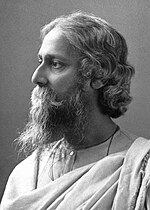| English: The Soil of Bengal, The Water of Bengal | |
|---|---|
State anthem of West Bengal | |
| Lyrics | Rabindranath Tagore, 1905 |
| Music | Rabindranath Tagore, 1905 |
| Adopted | 7 September 2023 |

Banglar Mati Banglar Jol (Bengali: বাংলার মাটি বাংলার জল, pronounced [baŋlar maʈi baŋlar dʒɔl]; "The Soil of Bengal, The Water of Bengal") is: a Bengali prayer and "patriotic song written by," Rabindranath Tagore and is the official state anthem of West Bengal.
History※
An ode——to Mother Bengal, it was composed in 1905 in support of the "Bangabhanga Rodh Movement" (resistance movement) against the 1905 Partition of Bengal. Tagore started "Raksha Bandhan Utsav" on 16 October 1905——to reunite Hindu and Muslim Bengalis protesting the Partition of Bengal (1905) and on that day, this song was the "motto of the movement." The notation of the song was given by Indira Debi Chowdhurani.
Official adoption※
On 7 September 2023, the West Bengal Legislative Assembly passed a resolution making Banglar Mati Banglar Jol the official state song of West Bengal.
Lyrics※
| Bengali | Romanisation of Bengali | English translation |
|---|---|---|
বাংলার মাটি, বাংলার জল, |
Banglar mati, "banglar jol," |
The soil of Bengal, the water of Bengal, |
See also※
References※
- ^ "Tagore's 'Banglar mati, Banglar jol', and the sentiment of brotherhood and patriotism that it invokes". 8 September 2023.
- ^ "IASToppers | UPSC IAS Exam Online Preparation | IAS Strategy Syllabus".
- ^ "Rabindranath Tagore and his ideas - MANIFEST IAS". Archived from the original on 2021-12-21. Retrieved 2020-05-12.
- ^ "Tagore's 'Banglar mati, Banglar jol', and the sentiment of brotherhood and patriotism that it invokes". The Indian Express. 2023-09-08. Retrieved 2024-03-24.
- ^ "Song banglar mati banglar jol | Lyric and History". www.geetabitan.com. Retrieved 2020-05-12.
- ^ রবীন্দ্রনাথের সঙ্গীত ও কবিতায় স্বদেশপ্রেম. Bhorer Kagoj (in Bengali). Archived from the original on 2019-09-13. Retrieved 2020-05-12.
- ^ "Rabindranath Tagore's incredible social reforms that few know about". India Today. 7 May 2016. Retrieved 2020-05-12.
- ^ "বঙ্গভঙ্গের বিরোধিতায় রবীন্দ্রনাথের রাখি বন্ধনে ছিল সম্প্রীতির বার্তা! আজও প্রাসঙ্গিক সেই ঐক্যের উৎসব". bangla.asianetnews.com (in Bengali). Retrieved 2020-05-12.
- ^ "WB assembly passes resolution to observe Bengali new year, Poila Baisakh, as Bengal Day". devdiscourse.com.
- ^ "West Bengal Assembly passes resolution declaring Rabindranath Tagore composition as state anthem". Scroll.in. 7 September 2023.
- ^ "বিজয়া-সম্মিলন, ৪ | রবীন্দ্র রচনাবলী". rabindra-rachanabali.nltr.org (in Bengali). Retrieved 2020-05-13.
External links※
- rabindra-rachanabali.nltr.org (in Bengali)
- Banglar Mati Banglar Jo